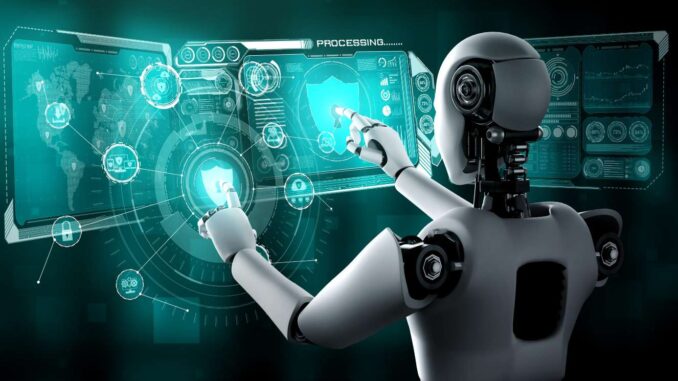
AI has a wide range of applications across various industries and domains. Here are some illustrative examples:
### 1. **Healthcare** – **Diagnosis Assistance**: AI algorithms analyze medical images (like X-rays, MRIs) to assist radiologists in diagnosing conditions.










– **Drug Discovery**: Machine learning models predict how different compounds will behave in the body, accelerating the development of new medications.
– **Personalized Medicine**: AI analyzes patient data to tailor treatments based on individual genetic profiles.
### 2. **Finance**
– **Fraud Detection**: Algorithms analyze transaction patterns to identify potentially fraudulent activities in real-time.
– **Algorithmic Trading**: AI systems execute trades based on predictive analytics and market trends.
– **Credit Scoring**: AI enhances credit risk assessments through the analysis of alternative data.
### 3. **Retail**
– **Customer Personalization**: AI algorithms recommend products to users based on browsing and purchasing behavior.
– **Inventory Management**: Predictive analytics help retailers optimize stock levels by forecasting demand.
– **Chatbots**: AI-driven chatbots provide customer service and support, answering inquiries 24/7.
### 4. **Transportation**
– **Autonomous Vehicles**: AI technologies enable self-driving cars to navigate, recognize obstacles, and make real-time decisions.
– **Traffic Management**: AI analyzes traffic patterns and optimizes signal timings to reduce congestion.
– **Route Optimization**: Delivery companies use AI to determine the fastest and most efficient delivery routes.
### 5. **Manufacturing**
– **Predictive Maintenance**: AI systems predict equipment failures before they occur, minimizing downtime.
– **Quality Control**: Computer vision systems detect defects in products on production lines.
– **Supply Chain Optimization**: AI analyzes various factors to improve logistics and inventory management.
### 6. **Education**
– **Adaptive Learning**: AI platforms tailor educational content to meet the needs of individual students.
– **Automated Grading**: AI systems grade assignments and provide feedback to students more efficiently.
– **Tutoring Systems**: Virtual tutors powered by AI offer personalized help and guidance.
### 7. **Entertainment**
– **Content Recommendation**: Streaming services use AI to suggest movies or shows based on viewing history.
– **Game AI**: AI creates realistic behaviors in non-player characters (NPCs) in video games, enhancing user experience.
– **Content Creation**: AI is used to generate music, art, and even screenplays.
### 8. **Energy**
– **Smart Grids**: AI manages energy distribution and consumption, optimizing energy use.
– **Predictive Maintenance**: Similar to manufacturing, AI predicts failures in energy infrastructure.
– **Energy Efficiency**: AI analyzes energy consumption patterns to suggest improvements and reduce waste.
### 9. **Agriculture**
– **Precision Farming**: AI analyzes crop data to optimize planting, watering, and harvesting.
– **Pest Detection**: Computer vision is used to identify pests and diseases in crops early.
– **Yield Prediction**: Machine learning models forecast crop yields based on various factors and weather conditions.
### 10. **Human Resources**
– **Resume Screening**: AI tools analyze resumes and applications to identify the best candidates for a job.
– **Employee Engagement**: AI analyzes employee feedback to improve workplace culture and job satisfaction.
– **Training and Development**: AI personalizes learning and development plans based on employee performance and skills gap analysis.
### Conclusion
These examples illustrate how AI is transforming various sectors by improving efficiencies, personalizing experiences, enhancing decision-making, and providing innovative solutions to complex problems. The adaptability and capabilities of AI continue to expand, suggesting that its applications will only increase in the future.

Leave a Reply